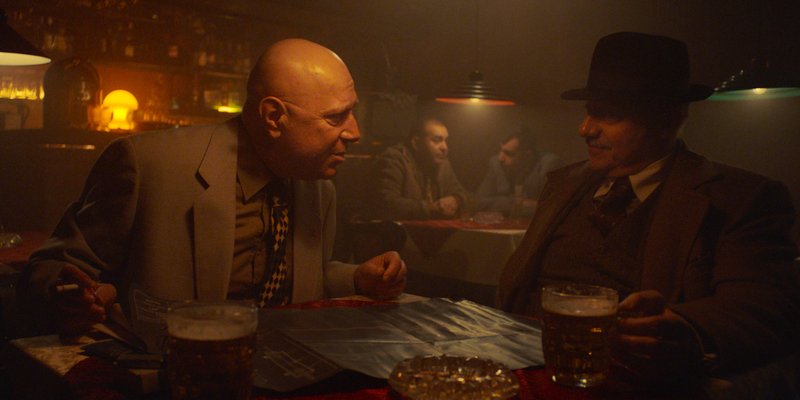
Review by
Ren Zelen
Directed by: Chino Moya
Starring: Johann Myers, Géza Röhrig, Michael Gould, Hayley Carmichael, Ned Dennehy,
Adrian Rawlins, Kate Dickie, Eric Godon, Tanya Reynolds, Burn Gorman,
Khalid Abdalla, Maddison Whelan, Tadhg Murphy

Spanish director Chino Moya's debut feature
Undergods leads us through a crumbling European dystopia in
what appears to be an apocalyptic wasteland. It’s grim, dilapidated,
grubby and unnerving. The narrative consists of three slightly
interweaving stories which emanate an unremitting tone of dread.
Framing the loosely interlinking stories are scavengers K (Johann Myers) and Z (Géza Röhrig), who roam the dirty post-Apocalyptic
landscape on the lookout for corpses... or someone they might turn into a
corpse (fresh meat).
The environment, disturbing as it is, is also aesthetically extraordinary.
Shot by cinematographer David Raedeker in unforgiving greys in what
look like nuclear-fallout regions, the ambition here was clearly to film
in the most brutal of Eastern European locales.

Within crumbling concrete blocks or rows of identical houses the stories
reveal relentless domestic conflicts, while slightly grubby business
fat-cats preside over dingy offices and slink through sordid underpasses
and slums to their relatively well-stocked, if still dimly lit,
apartments.
The viewer witnesses the ruin of three different men as their dull lives
begin to unravel. Their existence seems uneventful, punctuated only by
domestic indifference or disharmony. Then, in all cases, a stranger enters
the picture, with explosive results.
The first incident is set in a spartan new housing block, still under
construction, home to unhappy couple Ruth (Hayley Carmichael) and
Ron (Michael Gould). One night there is an unexpected knock on
their door. Apparently, Harry (Ned Dennehy), one of their
neighbours on an upper floor, has locked himself out of his flat and is
unable to reach the management. The pair feel compelled to offer him
shelter for the night, but inevitably, Harry is not quite what he seems to
be.
The second tale unfolds as a rather grim (Grimm) bedtime story and is told
by father Octavius (Khalid Abdalla) to his little daughter Horatia
(Maddison Whelan). It concerns Hans (Eric Gordon), a
modern-day businessman down on his luck. The only thing that Hans loves
more than money is his pretty daughter Maria (Tanya Reynolds) but,
like every relationship in Moya’s tales, theirs is on unsafe ground.
One day Hans is visited by an inventor offering blueprints for a
revolutionary engineering project. He’s an eccentric ‘foreigner’ (Jan Bivjoet) and Hans cannot resist the urge to appropriate his ideas and leave him
with nothing, an act of theft that leads to disastrous consequences.

The last tale concerns Dom (Adrian Rawlins) and Rachel (Kate Dickie), a married couple with a teenage son (Jonathan Case) who one
night discovers a silent intruder in their kitchen. The almost catatonic
interloper is Sam (Sam Louwyck), a ghost from Rachel's past who,
despite his almost complete inertia, creates anger and division in the
household.
Writer-director Moya plays with his stories in fragments, and the movie’s
efforts to link the characters’ lives doesn’t always come together very
successfully. The individual tales never feel like they fully deliver,
which is unfortunate because the concept was a promising one.
Undergods begins from a bleak basis and offers little
emotional variation across its 90 minutes. The film describes itself as ‘a
collection of darkly humorous, fantasy tales about ill-fated characters
and doomed fortune’ but if you can find anything to smile about in these
tales you must be blessed with a heightened form of gallows humour.
However, Moya has assembled a cast that can elevate the calibre of any
production and are well suited to their roles. Dennehy brings a quiet
menace to his character that his victims rarely see until it's too late,
while few actresses have the ability to convincingly escalate from mundane
indifference to full-blown frenzy like Dickie. Rawlins as Dom, and
Burn Gorman, as his boss, keep us guessing as to their motivations
and actions.

If you’re looking for shiny sci-fi escapism, you won’t find it in
Undergods. This is sci-fi for nihilists. In troubled times, here’s a film to make
you think we’ve got it good. Undergods offers a grotesque
and bleak message from a near-future where everything is ugly. There are
no chinks of hopeful light, no compassion, no love, no serenity, no
connection, everyone is exploiting everyone else, everyone is in
existential despair. There are explosions of violence and people simply
fall out of one hellish existence into an even more hellish one.
The painstaking production design and cinematography succeed in setting
the atmosphere of despair and disintegration. The gloom is alleviated with
occasional pops of colour, a yellow biohazard suit or pink overall. Add to
this an eerie electronic score by Wojciech Golczewski, whose
background is in horror films, and you have all you need to create a
dystopian nightmare.
Technically speaking, Undergods is arresting and ambitious,
but personally I won’t be in any hurry to watch it again. Compared to
Moya’s vision in Undergods, Orwell’s '1984' is lively, jaunty entertainment.

Undergods is on Shudder UK now.
